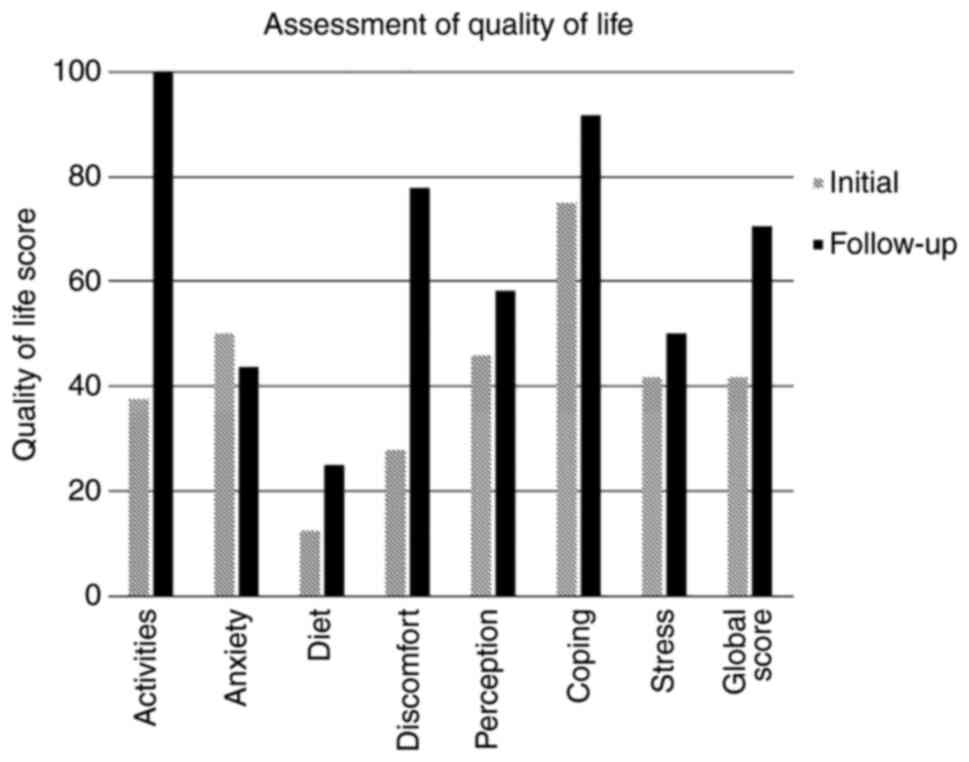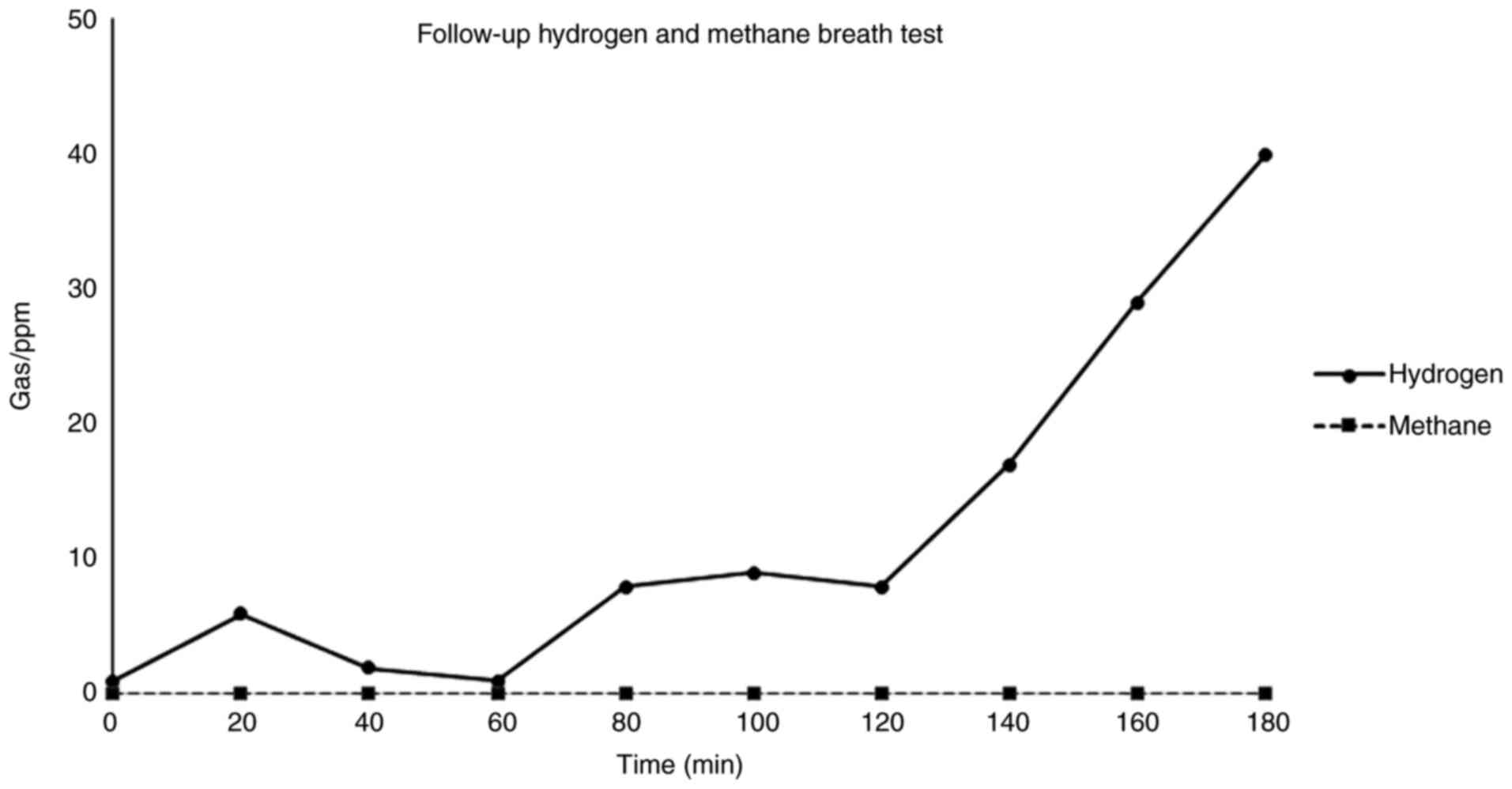|
1
|
Canavan C, West J and Card T: The
epidemiology of irritable bowel syndrome. Clin Epidemiol. 6:71–80.
2014.PubMed/NCBI View Article : Google Scholar
|
|
2
|
Drossman DA and Hasler WL: Rome
IV-Functional GI disorders: Disorders of gut-brain interaction.
Gastroenterology. 150:1257–1261. 2016.PubMed/NCBI View Article : Google Scholar
|
|
3
|
Camilleri M: Peripheral mechanisms in
irritable bowel syndrome. N Engl J Med. 367:1626–1635.
2012.PubMed/NCBI View Article : Google Scholar
|
|
4
|
Pimentel M, Chow EJ and Lin HC:
Eradication of small intestinal bacterial overgrowth reduces
symptoms of irritable bowel syndrome. Am J Gastroenterol.
95:3503–3506. 2000.PubMed/NCBI View Article : Google Scholar
|
|
5
|
Pyleris E, Giamarellos-Bourboulis EJ,
Tzivras D, Koussoulas V, Barbatzas C and Pimentel M: The prevalence
of overgrowth by aerobic bacteria in the small intestine by small
bowel culture: Relationship with irritable bowel syndrome. Dig Dis
Sci. 57:1321–1329. 2012.PubMed/NCBI View Article : Google Scholar
|
|
6
|
Carrara M, Desideri S, Azzurro M, Bulighin
GM, Di Piramo D, Lomonaco L and Adamo S: Small intestine bacterial
overgrowth in patients with irritable bowel syndrome. Eur Rev Med
Pharmacol Sci. 12:197–202. 2008.PubMed/NCBI
|
|
7
|
Ghoshal UC, Shukla R and Ghoshal U: Small
intestinal bacterial overgrowth and irritable bowel syndrome: A
bridge between functional organic dichotomy. Gut Liver. 11:196–208.
2017.PubMed/NCBI View
Article : Google Scholar
|
|
8
|
Pimentel M, Saad RJ, Long MD and Rao SSC:
ACG clinical guideline: Small intestinal bacterial overgrowth. Am J
Gastroenterol. 115:165–178. 2020.PubMed/NCBI View Article : Google Scholar
|
|
9
|
Corazza GR, Menozzi MG, Strocchi A,
Rasciti L, Vaira D, Lecchini R, Avanzini P, Chezzi C and Gasbarrini
G: The diagnosis of small bowel bacterial overgrowth. Reliability
of jejunal culture and inadequacy of breath hydrogen testing.
Gastroenterology. 98:302–309. 1990.PubMed/NCBI View Article : Google Scholar
|
|
10
|
American Gastroenterological Association
medical position statement: Guidelines for the evaluation and
management of chronic diarrhea. Gastroenterology. 116:1461–1463.
1999.PubMed/NCBI View Article : Google Scholar
|
|
11
|
Miele L, Valenza V, La Torre G, Montalto
M, Cammarota G, Ricci R, Masciana R, Forgione A, Gabrieli ML,
Perotti G, et al: Increased intestinal permeability and tight
junction alterations in nonalcoholic fatty liver disease.
Hepatology. 49:1877–1887. 2009.PubMed/NCBI View Article : Google Scholar
|
|
12
|
Kapil S, Duseja A, Sharma BK, Singla B,
Chakraborti A, Das A, Ray P, Dhiman RK and Chawla Y: Small
intestinal bacterial overgrowth and toll-like receptor signaling in
patients with non-alcoholic fatty liver disease. J Gastroenterol
Hepatol. 31:213–221. 2016.PubMed/NCBI View Article : Google Scholar
|
|
13
|
Dukowicz AC, Lacy BE and Levine GM: Small
intestinal bacterial overgrowth: A comprehensive review.
Gastroenterol Hepatol (NY). 3:112–122. 2007.PubMed/NCBI
|
|
14
|
Saad RJ and Chey WD: Breath testing for
small intestinal bacterial overgrowth: Maximizing test accuracy.
Clin Gastroenterol Hepatol. 12:1964–1972. 2014.PubMed/NCBI View Article : Google Scholar
|
|
15
|
Rezaie A, Buresi M, Lembo A, Lin H,
McCallum R, Rao S, Schmulson M, Valdovinos M, Zakko S and Pimentel
M: Hydrogen and methane-based breath testing in gastrointestinal
disorders: The north American consensus. Am J Gastroenterol.
112:775–784. 2017.PubMed/NCBI View Article : Google Scholar
|
|
16
|
The Association of Gastrointestinal
Physiology (AGIP) Committee of the British Society of
Gastroenterology (2019). Association of Gastrointestinal
Physiologists (AGIP) Proposed Standardised Testing Protocol for
Hydrogen/Methane Breath Testing (HMBT) to Assess Small Intestinal
Bacterial Overgrowth (SIBO) and Carbohydrate Malabsorption. 2019
British Society of Gastroenterology, (24 June 2019).
|
|
17
|
The European Parliament and the Council of
the European Union Regulation: Regulation (EU) 20-16/679 of the
European Parliament and of the Council of 27 April 2016 on the
protection of natural persons with regard to the processing of
personal data and on the free movement of such data, and repealing
Directive 95/46/EC (General Data Protection Regulation). Official
Journal of the European Union 2018. Available from: https://eur-lex.europa.eu/eli/reg/2016/679/oj.
Accessed at November, 2021.
|
|
18
|
Chassany O, Marquis P, Scherrer B, Read
NW, Finger T, Bergmann JF, Fraitag B, Geneve J and Caulin C:
Validation of a specific quality of life questionnaire for
functional digestive disorders. Gut. 44:527–533. 1999.PubMed/NCBI View Article : Google Scholar
|
|
19
|
Monash University: The Low FODMAP Diet.
Online May 2, 2019. https://www.monashfodmap.com/. Accessed November 10,
2019.
|
|
20
|
Shayto RH, Abou Mrad R and Sharara AI: Use
of rifaximin in gastrointestinal and liver diseases. World J
Gastroenterol. 22:6638–6651. 2016.PubMed/NCBI View Article : Google Scholar
|
|
21
|
Pimentel M: Review article: Potential
mechanisms of action of rifaximin in the management of irritable
bowel syndrome with diarrhoea. Aliment Pharmacol Ther. 43 (Suppl
1):S37–S49. 2016.PubMed/NCBI View Article : Google Scholar
|
|
22
|
Meyrat P, Safroneeva E and Schoepfer AM:
Rifaximin treatment for the irritable bowel syndrome with a
positive lactulose hydrogen breath test improves symptoms for at
least 3 months. Aliment Pharmacol Ther. 36:1084–1093.
2012.PubMed/NCBI View Article : Google Scholar
|
|
23
|
Sharara AI, Aoun E, Abdul-Baki H, Mounzer
R, Sidani S and Elhajj I: A randomized double-blind
placebo-controlled trial of rifaximin in patients with abdominal
bloating and flatulence. Am J Gastroenterol. 101:326–333.
2006.PubMed/NCBI View Article : Google Scholar
|
|
24
|
Pimentel M, Park S, Mirocha J, Kane SV and
Kong Y: The effect of a nonabsorbed oral antibiotic (rifaximin) on
the symptoms of the irritable bowel syndrome: A randomized trial.
Ann Intern Med. 145:557–563. 2006.PubMed/NCBI View Article : Google Scholar
|
|
25
|
Lai PK and Roy J: Antimicrobial and
chemopreventive properties of herbs and spices. Curr Med Chem.
11:1451–1460. 2004.PubMed/NCBI View Article : Google Scholar
|
|
26
|
Chedid V, Dhalla S, Clarke JO, Roland BC,
Dunbar KB, Koh J, Justino E, Tomakin E and Mullin GE: Herbal
therapy is equivalent to rifaximin for the treatment of small
intestinal bacterial overgrowth. Glob Adv Health Med. 3:16–24.
2014.PubMed/NCBI View Article : Google Scholar
|
|
27
|
Staudacher HM, Ralph FSE, Irving PM,
Whelan K and Lomer MCE: Nutrient intake, diet quality, and diet
diversity in irritable bowel syndrome and the impact of the low
FODMAP Diet. J Acad Nutr Diet. 120:535–547. 2020.PubMed/NCBI View Article : Google Scholar
|
|
28
|
McIntosh K, Reed DE, Schneider T, Dang F,
Keshteli AH, De Palma G, Madsen K, Bercik P and Vanner S: FODMAPs
alter symptoms and the metabolome of patients with IBS: A
randomised controlled trial. Gut. 66:1241–1251. 2017.PubMed/NCBI View Article : Google Scholar
|
|
29
|
Ong DK, Mitchell SB, Barrett JS, Shepherd
SJ, Irving PM, Biesiekierski JR, Smith S, Gibson PR and Muir JG:
Manipulation of dietary short chain carbohydrates alters the
pattern of gas production and genesis of symptoms in irritable
bowel syndrome. J Gastroenterol Hepatol. 25:1366–1373.
2010.PubMed/NCBI View Article : Google Scholar
|
|
30
|
Hustoft TN, Hausken T, Ystad SO, Valeur J,
Brokstad K, Hatlebakk JG and Lied GA: Effects of varying dietary
content of fermentable short-chain carbohydrates on symptoms, fecal
microenvironment, and cytokine profiles in patients with irritable
bowel syndrome. Neurogastroenterol Motil: Oct 16, 2016 (Epub ahead
of print). doi: 10.1111/nmo.12969.
|

















